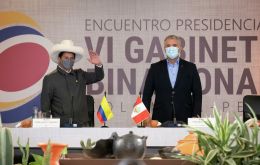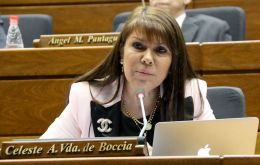MercoPress. South Atlantic News Agency
Politics
-
Friday, January 14th 2022 - 09:21 UTC
Bolsonaro is a “threat to democracy,” HRW says

President Jair Bolsonaro represents a “threat” to Brazilian democracy, according to Lawyer Maria Laura Canineu, head of the NGO Human Rights Watch (HRW) local office.
-
Friday, January 14th 2022 - 09:10 UTC
Colombia, Peru advance bilateral issues after a 2-year impasse

Colombian President Iván Duque Thursday met with his Peruvian counterpart Pedro Castillo Terrones at Villa de Leyva (165 kilometers north of Bogotá) to discuss the economic reactivation of the mutual border, as well as environmental issues and security matters.
-
Friday, January 14th 2022 - 08:59 UTC
FARC sentenced to pay US $ 36 million for Betancourt kidnapping

A US court has sentenced the former Revolutionary Armed Forces of Colombia (FARC) and several of its leaders to pay US $ 36 million for the kidnapping of politician Ingrid Betancourt, it was announced Thursday.
-
Friday, January 14th 2022 - 08:52 UTC
Queen's son stripped of his titles to face charges as a private citizen

Queen Elizabeth has decided to strip Prince Andrew of all of the royal offices and honorary military titles to have him face charges as a private citizen in the saga of the Jeffrey Epstein scandal in New York City.
-
Thursday, January 13th 2022 - 21:07 UTC
Paraguay: Congresswoman says drug money runs in all political parties

Congresswoman Celeste Amarilla from the Authentic Radical Liberal Party said “money from drug trafficking exists in all parties, although this criminal influence is more prevalent in the Colorado Party.”
-
Thursday, January 13th 2022 - 21:05 UTC
Argentine Government decrees two days of teleworking for public employees

Argentine President Alberto Fernández has decided that all civil servants go back to teleworking for two days -Jan. 13 and 14- as a result of the heat wave and the numeous problems with electricity supply.
-
Thursday, January 13th 2022 - 19:10 UTC
Argentina: Milei's salary as a lawmaker goes to Kirchnerite construction worker

Newly-elected Argentine Deputy Javier Milei hast kept his word and put out his salary on a raffle to prove he was not into politics for the money. The 40-year-old Federico Nacarado, who is far from being a Milei voter, entered the competition due to pressure from his spouse and will now be able to make some payments on his debts.
-
Thursday, January 13th 2022 - 09:59 UTC
Meat consumption in Argentina fell despite cap on exports

Argentina has recorded a 4.8% decline in meat consumption per inhabitant despite caps on exports imposed by the administration of President Alberto Fernández, which allegedly sought to prioritize the domestic market.
-
Thursday, January 13th 2022 - 09:50 UTC
Fifty years since the air link between Falkland Islands and Comodoro Rivadavia

Half a century ago, on 12 January 1972, a seaplane from the Argentine Air Force landed in Stanley harbor establishing the first regular flight between Comodoro Rivadavia and the Falkland Islands. From then onwards, ”sanitary, passenger and general cargo (mail, fresh food, and medicines) became regular flights”.
-
Thursday, January 13th 2022 - 09:48 UTC
World economy is facing Covid-19, inflation and policy uncertainty, Global Economic Prospects

Following a strong rebound in 2021, the global economy is entering a pronounced slowdown amid fresh threats from COVID-19 variants and a rise in inflation, debt, and income inequality that could endanger the recovery in emerging and developing economies, according to the World Bank’s latest Global Economic Prospects report. Global growth is expected to decelerate markedly from 5.5% in 2021 to 4.1% in 2022 and 3.2% in 2023 as pent-up demand dissipates and as fiscal and monetary support is unwound across the world.
